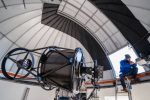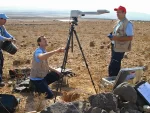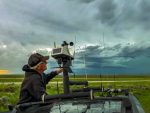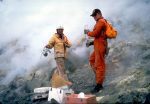Science
If you’re passionate about science and want to transform this into a rewarding career, this section is for you.
To help you decide which path to choose, we have compiled relevant career information about some of the most in-demand scientific professions.

How to Become an Anthropologist
An anthropologist studies and documents human behavior, physiology, and language. If you’re interested in human nature, psychology, biology, and history…

How to Become an Archeologist
An archeologist studies human societies past by investigating artifacts, architecture, and biological specimens left behind. If you enjoy history and…

How to Become an Astronaut
Astronauts are professionals who specialize in the human exploration of space. Although the most well-known and visible job duty is…

How to Become an Astronomer
An astronomer studies the skies, seeking to learn about and understand celestial bodies such as galaxies, stars, planets, and solar…

How to Become an Astrophysicist
Astrophysicists are experienced professionals who work in a focused branch of astronomy. Astrophysics is the specialized branch that centers on…

How to Become a Behavioral Scientist
Behavioral Scientists are individuals who are trained to research people and the way they act. They use this information in…

How to Become a Biochemist
Biochemistry is a branch of biology. Biochemists are considered biological scientists who specialize in a biological niche. They study the…

How to Become a Biologist
Biologists are trained professionals that spend their time observing and researching living organisms and wildlife. Also known as Biological Scientists,…

How to Become a Botanist
A botanist is a scientist dedicated to understanding and researching all forms of plant life. If you’re interested in biology…

How to Become a Chemist
A chemist is a scientist who is an expert in chemicals, molecules, and matter. If you enjoy chemistry, have strong…

How to Become a Gemologist
Gemologists are professionals who use their expertise and understanding in the study and science of gems. Individuals in this profession…

How to Become a Geographer
Individuals who want to become a Geographer may already know that they have a fondness for the earth, its land…

How to Become a Geologist
A geologist researches the earth’s surface and materials. Working as a geologist you could find yourself studying the history of…

How to Become a Geophysicist
Geophysicists work in the scientific field and study the physical components of the Earth including its processes (how it functions),…

How to Become a Marine Biologist
Marine Biology is a field of study and research dedicated to organisms and ecosystems of the sea. The job title…

How to Become a Mathematician
If you’re skilled at mathematics and would like to use your skills to solve problems and develop new theories, then…

How to Become a Meteorite Hunter
A meteorite hunter scours the globe to discover the remnants of meteorites that have fallen from the sky. If you’re…

How to Become a Meteorologist
Meteorologists study weather patterns and natural events, and use the data they collect to provide forecasts and weather warnings. If…

How to Become a Microbiologist
When you become a microbiologist, you will research the behaviors and characteristics of microscopic organisms such as bacteria or algae….

How to Become a Molecular Biologist
Individuals who study Molecular Science during their undergraduate degree have the option to become a Molecular Biologist . Molecular Biologists…

How to Become a Nuclear Technician
Nuclear Technicians are a specialized type of Science Technician whose work revolves around helping scientists improve products and procedures using…

How to Become an Oceanographer
Oceanographers are geoscientists who are specialized in the study of oceans and their coastal waters. In addition, they are also…

How to Become a Physicist
If you enjoy math and have an intense curiosity about the world around you, then you might like to become…

How to Become a Rocket Scientist
Aerospace Engineers, commonly referred to as Rocket Scientists, are professionals who work with aerospace aircraft, spacecraft, missiles or satellites. These…

How to Become a Seismologist
Seismologists are specialized professionals under a branch of the geoscience who focus on the study of the internal movement of…

How to Become a Storm Chaser
A storm chaser is a meteorological researcher who works on the field, very much in the center of all the…

How to Become a Toxicologist
Drugs and chemicals are a common presence in today’s modern culture. On the news we hear about accusations that celebrities…

How to Become a Veterinarian
If you love animals, and are interested in health and science, then you might like to become a veterinarian. Vets…

How to Become a Veterinary Technician
If you’re passionate about animals and their well being, then you might like to become a veterinary technician. These animal…

How to Become a Volcanologist
Volcanologists are professionals who specialize in a branch of geoscience. These professionals are experienced in studying, observing and gathering information…

How to Become a Zookeeper
If you love all different types of animals, then you might like to become a zookeeper. Zookeepers see to the…

How to Become a Zoologist
Individuals who love working with animals may want to think about how to become a Zoologist or its similar counterpart,…
Work Environment
This field includes very different professions and as a result, the work schedule and the work environment vary widely depending on the field of expertise and the industry of employment.
According to the Bureau of Labor Statistics, veterinarians held approximately 88,800 jobs in 2020 in the United States, most of them working in the field of veterinary services.
The same report shows that approximately 11 percent of all veterinarians were self-employed.
Physicists held about 17,400 jobs in the United States, most of them working in scientific research or for the federal government.
Zoologists held approximately 18,500 jobs, most of them working for state governments or the federal government.
Work environments, daily schedules, and job descriptions vary depending on the scientists’ area of expertise.
In some cases, being a scientist means working in front of a computer and analyzing sets of data, while in other cases it means collecting samples or working in the laboratory.
Some scientists, such as biochemists and biophysicists work in laboratories and offices where they conduct experiments and analyze results.
Other scientists, such as geoscientists or archeologists, spend a significant part of their workday in the field, and they may travel to remote locations and spend days and months away from home.
Many scientists work in interdisciplinary teams that include specialists in different scientific fields, as well as specialists in computer science or statistics.
Some scientists, especially those who work in laboratories, may work with dangerous substances or organisms, and following safety protocol is essential to avoid contamination.
Others need good physical skills as they spend a lot of time outdoors, sometimes in severe weather.
Scientists typically work full time and keep regular hours, but some situations require additional hours.
There are also situations when they have to work during weekends and evenings to perform time-sensitive laboratory experiments or collect specific samples in the field.
Education Requirements
Education requirements vary depending on the field of expertise and range from a certificate to a Ph.D.
If you want to become a scientist, you should start by taking science and math classes in high school.
Many gemologists graduate from the Gemological Institute of America, and others have completed a post-secondary diploma program that lasts between a few months and one year.
An associate degree is usually enough for a position as a nuclear technician, but this occupation also requires extensive on-the-job training and a rigorous background check.
Nuclear technicians typically need to receive a security clearance before being hired.
Veterinary technicians usually have a two-year associate’s degree, while veterinary technologists have a four-year bachelor’s degree in veterinary technology.
Veterinarians need a Doctor of Veterinary Medicine degree, which can be obtained after four years of veterinary medicine program.
Admission to these programs is quite competitive, and applicants typically need a bachelor’s degree in a related field, such as biology.
Applicants need to have taken classes in biology, chemistry, and animal science in college.
Veterinarians also need a state license which means that they have to pass the North American Veterinary Licensing Examination after completing a veterinary medicine program.
Each state’s exam covers the laws and regulations that apply to the veterinarian profession in that state.
Mathematicians and statisticians, two of the most in-demand science professions, typically need at least a master’s degree in mathematics or statistics, although the entry-level positions may also be open for candidates with a bachelor’s degree.
A doctoral degree can help mathematicians advance in their careers.
If you want to become a mathematician, you should start preparing in high school by taking all the available math classes.
Physicists and astronomers usually need a Ph.D., especially for jobs in research or academia, but some physicist positions can be filled in with a bachelor’s degree.
A bachelor’s degree in physics is usually enough for positions as assistants or technicians.
A Ph.D. is also required for biochemists and biophysicists who want to work independently in research and development positions.
However, a bachelor’s or master’s degree may be enough for some entry-level positions in a laboratory.
Geologists need at least a bachelor’s degree, and they are licensed in 31 states.
A license is required for geologists who offer services to the public, especially if they work in civil engineering projects or projects that involve environmental protection or regulatory compliance.
Besides formal education, scientists also need some personal skills, such as:
- Analytical skills are needed for all scientists that use mathematical techniques in their research.
- Communication skills are important, especially for those who work in teams with other scientists.
- Problem-solving skills are required for all science professions because they sometimes need to find solutions to problems that occur during the research process.
- Being thorough and remaining focused on the project is important for most scientists as scientific research usually involves trial and error.
Salary Information
The Bureau of Labor Statistics groups life, physical, and social science occupations together and calculated the median annual wage for these occupations at $69,760 as of May 2020.
The median wage shows us that half of all workers in this field earned more than this while half earned less.
The median wage across all occupations in the United States was $41,950, which means that a career in science can help you earn more than the national average.
However, wages for scientists vary widely depending on the occupation and area of expertise.
There are professions, such as physicist, rocket scientist, or astrophysicist, that make more than $100,000 per year on average.
However, there are also occupations, such as gemologist or veterinary technician, that make less than $50,000.
Salaries also vary depending on education, experience level, region of employment, and many other factors.
For example, the median annual wage for astronomers was $119,730, but the lowest 10 percent of all workers in this profession made less than $62,410, while the top 10 percent made more than $189,690.
According to the numbers published by the Bureau of Labor Statistics, some of the best-paid science professions are:
- Physicists – with the median annual wage calculated at $129,850.
- Astronomers – with the median salary estimated at $119,730 per year.
- Aerospace Engineers – who earned $118,610 per year, on average.
There are also professions with salaries in the $80,000-$90,000 range.
In this category, we have behavioral scientists, biologists, chemists, geographers, nuclear technicians.
On the lower end of the range, we have occupations that typically pay less than the national average.
One such example is the veterinary technician and technologist professions, which were remunerated with $36,260, on average.
One way to improve earning prospects as a veterinary technician is by earning additional certifications, relocating, or gaining some experience in the field.
The top 10 percent of all veterinary technicians earned more than $52,410.
The average annual wage reported by jewelers and metal workers- a category that includes gemologists (scientists who analyze gemstones)-was $41,900- close to the national median salary across all occupations.
Job Outlook
According to the Bureau of Labor Statistics, employment in life, physical, and social science occupations will grow 8 percent from 2020 to 2030, resulting in 113,800 new jobs.
There will be a high demand for workers who specialize in biomedical research and environmental protection.
Most science professions will grow in the future, but the rates vary between 3 and more than 30 percent.
The demand for mathematicians and statisticians, for example, is projected to grow 33 percent from 2020 to 2030, higher than the average across all occupations.
As statistical analysis becomes more widespread as a tool for making informed business decisions, the demand for people who understand numbers and trends will grow.
Additional job openings for mathematicians and statisticians will occur, especially in research, development, consulting, and the field of computer systems but also in academia.
Employment for veterinarians will reportedly grow 17 percent over the decade, mostly because more people have pets.
Another growth factor is technology advancement, which makes veterinarians now able to administer cancer treatments and perform more complicated procedures.
Veterinary technicians and technologists will see job growth of 15 percent by 2030, resulting in 10,400 new jobs each year.
BLS estimates job growth of 5 percent for biochemists and biophysicists but the growth is limited mainly due to budgetary constraints.
Some professions will decline in the next decade.
Employment for nuclear technicians, for example, will decline 12 percent.
This is caused mainly by the fact that automation has increased the productivity of traditional sources of power generation.
As alternative forms of energy replace traditional sources, fewer workers will be needed in the field of traditional energy production.
Frequently Asked Questions
What type of degree do scientists need?
Most science professions need at least a master’s degree, which can be obtained after six years of post-secondary study.
For some positions, you may need a Doctoral degree for advancement, which means a few more years of study and research.
This section also includes professions such as gemologist or veterinary technician- which typically need less than two years of study beyond high school.
What prospects do scientists have?
Although most scientific professions are expected to grow in the future, some fields will see a decline.
Mathematicians, statisticians, and veterinarians are among the professions that will see significant growth in the future.
Jobs in the nuclear energy field, on the other hand, will decline – mostly due to the development of alternative methods of power generation.
How much does a scientist make?
Salaries in the scientific field vary widely depending on specialty, employer, education, region, and many other factors.
Entry-level workers in fields such as veterinary science start with salaries that are below the $30,000-per-year threshold, while experienced scientists who hold a Ph.D. and work in biochemistry typically make more than $90,000 per year.
What skills does a scientist need?
Scientists need knowledge in their field of expertise but also some personal skills.
Analytical skills, for example, are needed for all those who work with numerical data and have to analyze trends.
Communication skills are very important, especially for those who work in teams.
Perseverance is also needed because scientists often perfect their methods through trial and error and they have to stay motivated.









